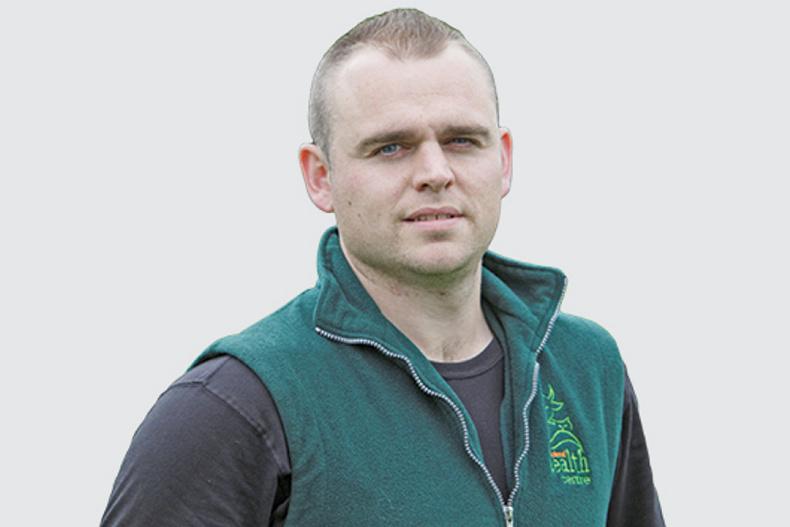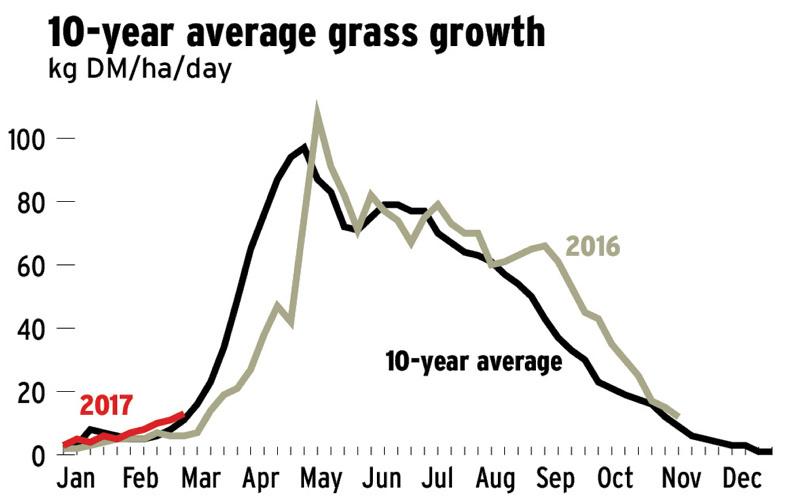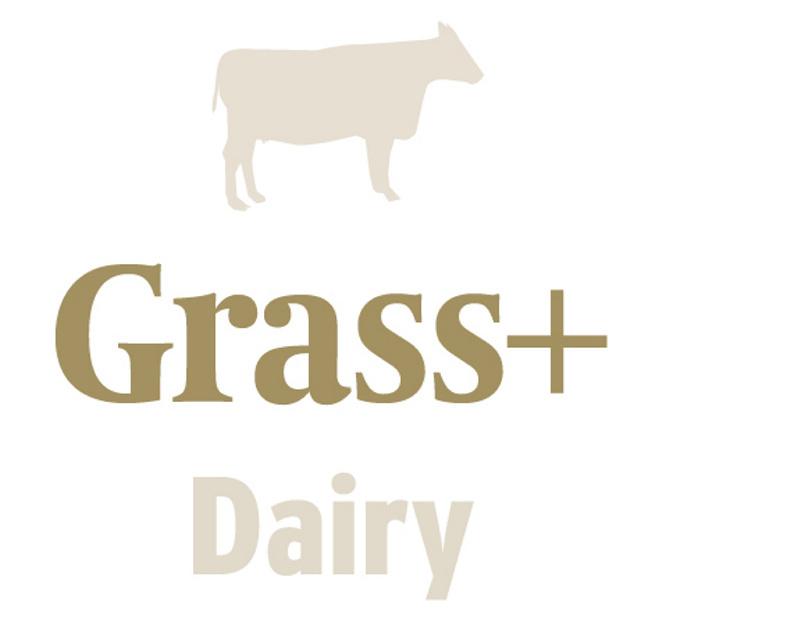There has been no improvement in the weather over the past week with between 30mm and 70mm of rain, depending on where you are. This is over three times the normal in many cases. As a result, many farmers have now thrown in the towel to grazing and have the cows housed fully.
Where sheds are available it makes sense to use them when conditions are bad. There is no point in doing damage when it can be avoided. The key thing though is to continuously assess ground conditions and the forecast and make a call on whether or not grazing is possible on your farm after every milking.
There are still a good few herds managing to get cows out to grass on a near-daily basis. Reasonably dry land, good access, ingenuity with temporary fences, regular monitoring and a can-do attitude are the main ingredients to making this work. There is no doubt it’s a huge challenge in this difficult weather.
They say March has many weathers, so let’s hope it changes soon. Are you ready for when it does change? You will need to act quickly to catch up on area grazed. Other stock such as heifers should be turned out also, if average farm cover is high (more than 900kg/ha).
Farmers who are out grazing cows are finding that allocating a little bit extra grass and only leaving them out for the minimum of two or three hours works best at reducing damage. While some damage is unavoidable, it should be minimised as much as possible.
At this stage most farmers would be planning to spread their second round of nitrogen fertiliser. With the weather very mixed, it is better to hold off until conditions improve. Growth rates are good at an average of 13kg/day on our Grass+ farms.
![]()

Teagasc Curtins
Co Cork
Stocking rate (cows/ha) 2.96
Growth rate (kg/day) 22
Average farm cover (kg/ha) 978
Yield (l/cow/day) 21.6
Fat % 5.48
Protein % 3.43
Milk solids (kg/cow) 1.98
Supplement fed (kg/cow/day) 3
The weather has been very bad here over the past week. The cows were in on silage for four grazings over the past week and when they did go out it was only for two or three hours at most. We are now grazing lighter covers of 1,200kg or so. I am allocating the cows 11kg of grass and 3kg of meal, plus about 1kg of silage when they go back into the shed. I tried allocating more grass, but they didn’t eat it. We have 38% of the farm grazed and 81% of the herd calved. Other than the weather, things are going well.

Mallow
Co Cork
Stocking rate (cows/ha) 2.8
Growth rate (kg/day) 13
Average farm cover (kg/ha) 1,052
Yield (l/cow/day) 27.7
Fat % 4.72
Protein % 3.20
Milk solids (kg/cow) 2.26
Supplement fed (kg/cow/day) 6
Grazing is very stop-start, and the cows don’t know if they are coming or going. They are going out for a few hours whenever they can but it’s tough work, as there isn’t much drying these days. The murky weather is as bad as heavy rain. I was feeding 4kg of meal but I increased it to 6kg, because they are milking a lot and I’m concerned they will lose body condition. I have 27% of the farm grazed and over 90% of the herd calved, so we won’t be long in catching up on grazing when the weather does improve.

Mountbellew
Ag College, Co Galway
Stocking rate (cows/ha) 2.97
Growth rate (kg/day) 906
Average farm cover (kg/ha) 10
Yield (l/cow/day) 17
Fat % 5.01
Protein % 3.66
Milk solids (kg/cow) 1.52
Supplement fed (kg/cow/day) 4
We are on/off grazing here whenever we can. Cows were housed fully over the weekend, but we let them back out for a few hours on Monday and Tuesday. It’s hard to avoid damage, even after a few hours, and clean-out isn’t great. But the recovery on the grazed paddocks is huge. At this stage we have 18% of the farm grazed, while our target is 27%. We have 50% of the cows calved. We spread 30 units of urea/acre in late January and the plan is to go again on 10 March with the same, depending on the weather.

Teagasc Ballyhaise
Co Cavan
Stocking rate (cows/ha) 2.9
Growth rate (kg/day) 3
Average farm cover (kg/ha) 925
Yield (l/cow/day) 19.4
Fat % 5.05
Protein % 3.49
Milk solids (kg/cow) 1.71
Supplement fed (kg/cow/day) 3
We are back grazing again after being in full-time for a few days over last weekend, but it is very stop-start. When cows do go out it is only for two or three hours at a time. I have been allocating a bit more grass each day to try and help prevent damage, which seems to be working fairly OK, as damage is limited but clean-out is poor. That said, I’m happier to sacrifice clean-out if it means avoiding damage. We are not feeding any silage unless cows are staying in, and they seem to be a lot more settled as a result.

Read more
Grass+ beef: cattle indoors as rain stops play
There has been no improvement in the weather over the past week with between 30mm and 70mm of rain, depending on where you are. This is over three times the normal in many cases. As a result, many farmers have now thrown in the towel to grazing and have the cows housed fully.
Where sheds are available it makes sense to use them when conditions are bad. There is no point in doing damage when it can be avoided. The key thing though is to continuously assess ground conditions and the forecast and make a call on whether or not grazing is possible on your farm after every milking.
There are still a good few herds managing to get cows out to grass on a near-daily basis. Reasonably dry land, good access, ingenuity with temporary fences, regular monitoring and a can-do attitude are the main ingredients to making this work. There is no doubt it’s a huge challenge in this difficult weather.
They say March has many weathers, so let’s hope it changes soon. Are you ready for when it does change? You will need to act quickly to catch up on area grazed. Other stock such as heifers should be turned out also, if average farm cover is high (more than 900kg/ha).
Farmers who are out grazing cows are finding that allocating a little bit extra grass and only leaving them out for the minimum of two or three hours works best at reducing damage. While some damage is unavoidable, it should be minimised as much as possible.
At this stage most farmers would be planning to spread their second round of nitrogen fertiliser. With the weather very mixed, it is better to hold off until conditions improve. Growth rates are good at an average of 13kg/day on our Grass+ farms.
![]()

Teagasc Curtins
Co Cork
Stocking rate (cows/ha) 2.96
Growth rate (kg/day) 22
Average farm cover (kg/ha) 978
Yield (l/cow/day) 21.6
Fat % 5.48
Protein % 3.43
Milk solids (kg/cow) 1.98
Supplement fed (kg/cow/day) 3
The weather has been very bad here over the past week. The cows were in on silage for four grazings over the past week and when they did go out it was only for two or three hours at most. We are now grazing lighter covers of 1,200kg or so. I am allocating the cows 11kg of grass and 3kg of meal, plus about 1kg of silage when they go back into the shed. I tried allocating more grass, but they didn’t eat it. We have 38% of the farm grazed and 81% of the herd calved. Other than the weather, things are going well.

Mallow
Co Cork
Stocking rate (cows/ha) 2.8
Growth rate (kg/day) 13
Average farm cover (kg/ha) 1,052
Yield (l/cow/day) 27.7
Fat % 4.72
Protein % 3.20
Milk solids (kg/cow) 2.26
Supplement fed (kg/cow/day) 6
Grazing is very stop-start, and the cows don’t know if they are coming or going. They are going out for a few hours whenever they can but it’s tough work, as there isn’t much drying these days. The murky weather is as bad as heavy rain. I was feeding 4kg of meal but I increased it to 6kg, because they are milking a lot and I’m concerned they will lose body condition. I have 27% of the farm grazed and over 90% of the herd calved, so we won’t be long in catching up on grazing when the weather does improve.

Mountbellew
Ag College, Co Galway
Stocking rate (cows/ha) 2.97
Growth rate (kg/day) 906
Average farm cover (kg/ha) 10
Yield (l/cow/day) 17
Fat % 5.01
Protein % 3.66
Milk solids (kg/cow) 1.52
Supplement fed (kg/cow/day) 4
We are on/off grazing here whenever we can. Cows were housed fully over the weekend, but we let them back out for a few hours on Monday and Tuesday. It’s hard to avoid damage, even after a few hours, and clean-out isn’t great. But the recovery on the grazed paddocks is huge. At this stage we have 18% of the farm grazed, while our target is 27%. We have 50% of the cows calved. We spread 30 units of urea/acre in late January and the plan is to go again on 10 March with the same, depending on the weather.

Teagasc Ballyhaise
Co Cavan
Stocking rate (cows/ha) 2.9
Growth rate (kg/day) 3
Average farm cover (kg/ha) 925
Yield (l/cow/day) 19.4
Fat % 5.05
Protein % 3.49
Milk solids (kg/cow) 1.71
Supplement fed (kg/cow/day) 3
We are back grazing again after being in full-time for a few days over last weekend, but it is very stop-start. When cows do go out it is only for two or three hours at a time. I have been allocating a bit more grass each day to try and help prevent damage, which seems to be working fairly OK, as damage is limited but clean-out is poor. That said, I’m happier to sacrifice clean-out if it means avoiding damage. We are not feeding any silage unless cows are staying in, and they seem to be a lot more settled as a result.

Read more
Grass+ beef: cattle indoors as rain stops play











 This is a subscriber-only article
This is a subscriber-only article
















SHARING OPTIONS: